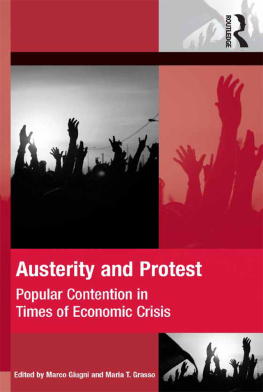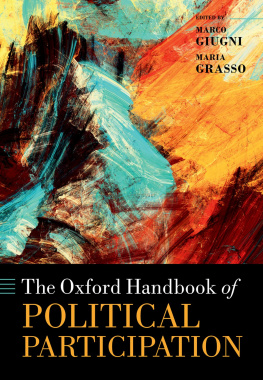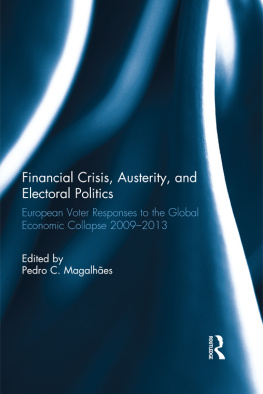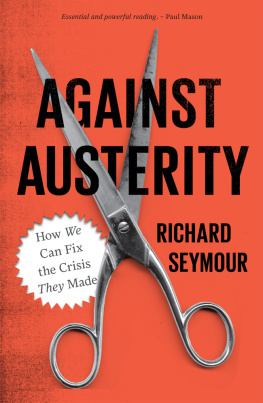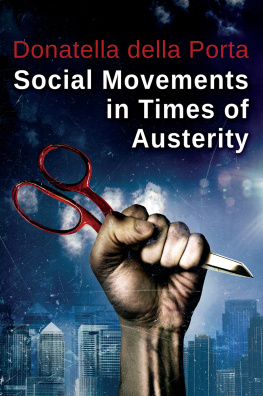Marco Giugni - Austerity and Protest: Popular Contention in Times of Economic Crisis
Here you can read online Marco Giugni - Austerity and Protest: Popular Contention in Times of Economic Crisis full text of the book (entire story) in english for free. Download pdf and epub, get meaning, cover and reviews about this ebook. year: 2016, publisher: Routledge, genre: Politics. Description of the work, (preface) as well as reviews are available. Best literature library LitArk.com created for fans of good reading and offers a wide selection of genres:
Romance novel
Science fiction
Adventure
Detective
Science
History
Home and family
Prose
Art
Politics
Computer
Non-fiction
Religion
Business
Children
Humor
Choose a favorite category and find really read worthwhile books. Enjoy immersion in the world of imagination, feel the emotions of the characters or learn something new for yourself, make an fascinating discovery.
- Book:Austerity and Protest: Popular Contention in Times of Economic Crisis
- Author:
- Publisher:Routledge
- Genre:
- Year:2016
- Rating:3 / 5
- Favourites:Add to favourites
- Your mark:
- 60
- 1
- 2
- 3
- 4
- 5
Austerity and Protest: Popular Contention in Times of Economic Crisis: summary, description and annotation
We offer to read an annotation, description, summary or preface (depends on what the author of the book "Austerity and Protest: Popular Contention in Times of Economic Crisis" wrote himself). If you haven't found the necessary information about the book — write in the comments, we will try to find it.
Marco Giugni: author's other books
Who wrote Austerity and Protest: Popular Contention in Times of Economic Crisis? Find out the surname, the name of the author of the book and a list of all author's works by series.
Austerity and Protest: Popular Contention in Times of Economic Crisis — read online for free the complete book (whole text) full work
Below is the text of the book, divided by pages. System saving the place of the last page read, allows you to conveniently read the book "Austerity and Protest: Popular Contention in Times of Economic Crisis" online for free, without having to search again every time where you left off. Put a bookmark, and you can go to the page where you finished reading at any time.
Font size:
Interval:
Bookmark:
San Diego State University, USA
Edited by Federico M. Rossi and Marisa von Blow
Edited by Lisheng Dong, Hanspeter Kriesi and Daniel Kbler
Shifting Paradigms
Alexander Koensler
International Perspectives on Weakly Resourced Groups
Edited by Didier Chabanet and Frdric Royall
The Origins and Interactions of the Clean Clothes Campaign
Philip Balsiger
Edited by Nella Van Dyke and David S. Meyer
University of Geneva, Switzerland
University of Sheffield, UK

2 Park Square, Milton Park, Abingdon, Oxon OX14 4RN
711 Third Avenue, New York, NY 10017, USA
Product or corporate names may be trademarks or registered trademarks, and are used only for identification and explanation without intent to infringe.
Giugni and Maria T. Grasso.
ISBN 978-1-4724-3920-8 (epub) 1. Economic policy. 2. Financial crises. 3. Social
movementsPolitical aspects. 4. Protest movements. I. Giugni, Marco, editor.
II. Grasso, Maria T. (Maria Teresa), 1984 editor.
Austerity and Protest: Debates and Challenges
Font size:
Interval:
Bookmark:
Similar books «Austerity and Protest: Popular Contention in Times of Economic Crisis»
Look at similar books to Austerity and Protest: Popular Contention in Times of Economic Crisis. We have selected literature similar in name and meaning in the hope of providing readers with more options to find new, interesting, not yet read works.
Discussion, reviews of the book Austerity and Protest: Popular Contention in Times of Economic Crisis and just readers' own opinions. Leave your comments, write what you think about the work, its meaning or the main characters. Specify what exactly you liked and what you didn't like, and why you think so.

